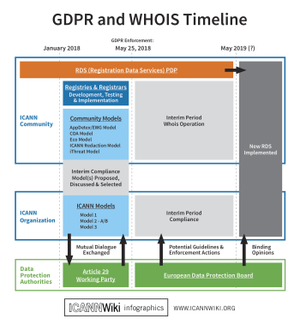General Data Protection Regulation
The Global Data Protection Regulation (GDPR) or Regulation (EU) 2016/679[1] is a regulation aimed at protecting all EU citizens and residents from privacy and data breaches. It was adopted on 14 April 2016 by the European Parliament (EP) after four years of collaborative drafting and negotiations.[2] The regulation is also an update of Data Protection Directive. Enforcement for the GDPR goes into effect on 25 May 2018.[3]
The GDPR places specific legal obligations on 'controllers' and 'processors', those who acts as intermediaries between the user/consumer and themselves, the government or any other actor. The controller determines how and why data is processed and processors act on the controller's behalf. Processors maintain data records and are held responsible in case of a breach.
With the update on existing legislation, the GDPR is more precise and inclusive of what constitutes private information than its predecessor. Personal data, that is anything that can identify a user, including an IP address is included, as well as 'sensitive personal data' which may include genetic and biomedical data.
GDPR and WHOIS
The GDPR directly impacts the domain name space, most notability the WHOIS service. Prior to the GDPR enforcement date, ICANN's contracted parties (Registries and Registrars) expressed concern about their about to comply with their contractual requirement and be GDPR compliant. In light of this concern and the uncertainty around the implications of GDPR on WHOIS, ICANN announced that it would defer action against registries and registrars for noncompliance related to registration data.[4]
Regulations Of GDPR
The regulation applies if the data controller (an organization that collects data from EU residents) or processor (an organization that processes data on behalf of data controller e.g. cloud service providers) or the data subject (person) is based in the EU. Furthermore the regulation also applies to organizations based outside the European Union if they collect or process personal data of EU residents. According to the European Commission "personal data is any information relating to an individual, whether it relates to his or her private, professional or public life. It can be anything from a name, a home address, a photo, an email address, bank details, posts on social networking websites, medical information, or a computer’s IP address.
The regulation does not purport to apply to the processing of personal data for national security activities or law enforcement within the European Union; however, industry groups concerned about facing a potential conflict of laws have questioned whether Article 48 of the GDPR could be invoked to seek to prevent a data controller subject to a third country's laws from complying with a legal order from that country's law enforcement, judicial, or national security authorities to disclose to such authorities the personal data of an EU person, regardless of whether the data resides inside or outside the EU. Article 48 states that any judgment of a court or tribunal and any decision of an administrative authority of a third country requiring a controller or processor to transfer or disclose personal data may only be recognized or enforceable in any manner if based on an international agreement, such as a mutual legal assistance treaty in force between the requesting third (non-EU) country and the Union or a Member State, The data protection reform package also includes a separate Data Protection Directive for the police and criminal justice sector that provides rules on personal data exchanges at national, European and international level.
References
- ↑ Regulation (EU) 2016/679 of the European Parliament and of the Council 27 April 2016
- ↑ Lexology - EU General Data Protection Regulation Finally Adopted 15 April 2016
- ↑ Reform of EU data protection rules. Retrieved 27 Jun 2017.
- ↑ ICANN Contractual Compliance Statement Accessed 2 February 2018
